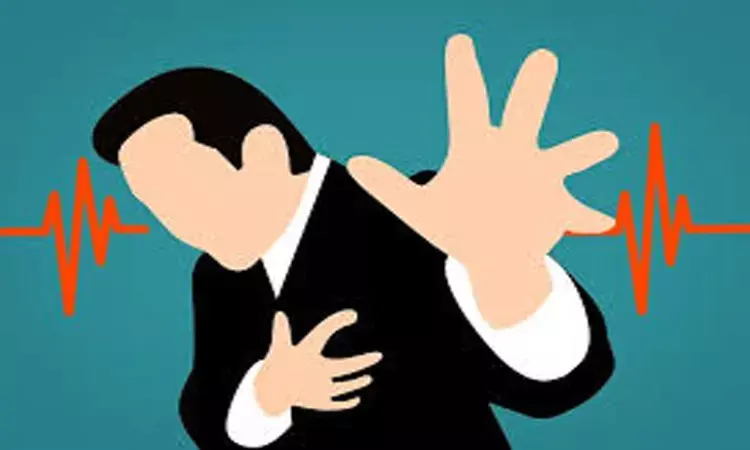- Home
- Medical news & Guidelines
- Anesthesiology
- Cardiology and CTVS
- Critical Care
- Dentistry
- Dermatology
- Diabetes and Endocrinology
- ENT
- Gastroenterology
- Medicine
- Nephrology
- Neurology
- Obstretics-Gynaecology
- Oncology
- Ophthalmology
- Orthopaedics
- Pediatrics-Neonatology
- Psychiatry
- Pulmonology
- Radiology
- Surgery
- Urology
- Laboratory Medicine
- Diet
- Nursing
- Paramedical
- Physiotherapy
- Health news
- Fact Check
- Bone Health Fact Check
- Brain Health Fact Check
- Cancer Related Fact Check
- Child Care Fact Check
- Dental and oral health fact check
- Diabetes and metabolic health fact check
- Diet and Nutrition Fact Check
- Eye and ENT Care Fact Check
- Fitness fact check
- Gut health fact check
- Heart health fact check
- Kidney health fact check
- Medical education fact check
- Men's health fact check
- Respiratory fact check
- Skin and hair care fact check
- Vaccine and Immunization fact check
- Women's health fact check
- AYUSH
- State News
- Andaman and Nicobar Islands
- Andhra Pradesh
- Arunachal Pradesh
- Assam
- Bihar
- Chandigarh
- Chattisgarh
- Dadra and Nagar Haveli
- Daman and Diu
- Delhi
- Goa
- Gujarat
- Haryana
- Himachal Pradesh
- Jammu & Kashmir
- Jharkhand
- Karnataka
- Kerala
- Ladakh
- Lakshadweep
- Madhya Pradesh
- Maharashtra
- Manipur
- Meghalaya
- Mizoram
- Nagaland
- Odisha
- Puducherry
- Punjab
- Rajasthan
- Sikkim
- Tamil Nadu
- Telangana
- Tripura
- Uttar Pradesh
- Uttrakhand
- West Bengal
- Medical Education
- Industry
Empagliflozin lowers death risk in HF in non Diabetics also: NEJM

USA: The use of SGLT2 inhibitor empagliflozin in heart failure patients lowers the risk of cardiovascular death and hospitalization for heart failure regardless of the absence or presence of diabetes, suggests a recent study in NEJM.
Sodium-glucose cotransporter 2 (SGLT2) inhibitors are known to reduce the risk of hospitalization in heart failure patients regardless of the absence or presence of diabetes. More evidence is required on the effects of these drugs across the broad spectrum of heart failure, including those having a markedly reduced ejection fraction. To determine the same, Milton Packer, Baylor University Medical Center, Dallas, and colleagues conducted a double-blind trial that included 3730 patients with class II, III, or IV heart failure and an ejection fraction of 40% or less. They were randomly assigned to receive 40% or less to receive empagliflozin (10 mg once daily) or placebo, in addition to recommended therapy.
The primary outcome was a composite of cardiovascular death or hospitalization for worsening heart failure.
Key findings of the study include:
- During a median of 16 months, a primary outcome event occurred in 361 of 1863 patients (19.4%) in the empagliflozin group and in 462 of 1867 patients (24.7%) in the placebo group (hazard ratio for cardiovascular death or hospitalization for heart failure, 0.75).
- The effect of empagliflozin on the primary outcome was consistent in patients regardless of the presence or absence of diabetes.
- The total number of hospitalizations for heart failure was lower in the empagliflozin group than in the placebo group (hazard ratio, 0.70).
- The annual rate of decline in the estimated glomerular filtration rate was slower in the empagliflozin group than in the placebo group (–0.55 vs. –2.28 ml per minute per 1.73 m2 of body-surface area per year), and empagliflozin-treated patients had a lower risk of serious renal outcomes.
- Uncomplicated genital tract infection was reported more frequently with empagliflozin.
"Empagliflozin was associated with a reduced incidence in cardiovascular death or hospitalization for heart failure compared with placebo among patients with class II–IV heart failure with reduced ejection fraction, wrote the authors.
"Empagliflozin may provide a cardioprotective effect regardless of the presence, or not, of diabetes," they concluded.
The study, "Cardiovascular and Renal Outcomes with Empagliflozin in Heart Failure," is published in the New England Journal of Medicine.
https://www.nejm.org/doi/pdf/10.1056/NEJMoa2022190
Dr Kamal Kant Kohli-MBBS, DTCD- a chest specialist with more than 30 years of practice and a flair for writing clinical articles, Dr Kamal Kant Kohli joined Medical Dialogues as a Chief Editor of Medical News. Besides writing articles, as an editor, he proofreads and verifies all the medical content published on Medical Dialogues including those coming from journals, studies,medical conferences,guidelines etc. Email: drkohli@medicaldialogues.in. Contact no. 011-43720751


